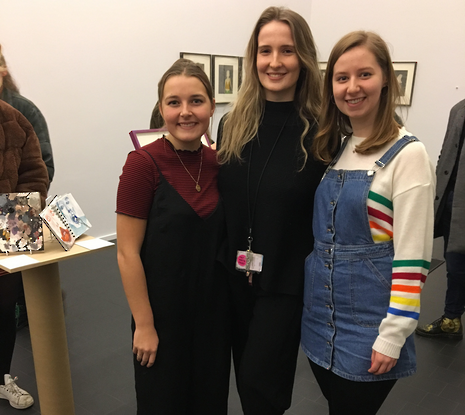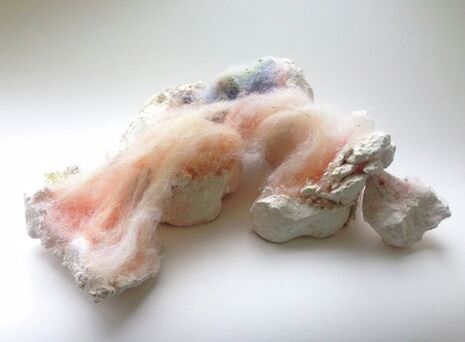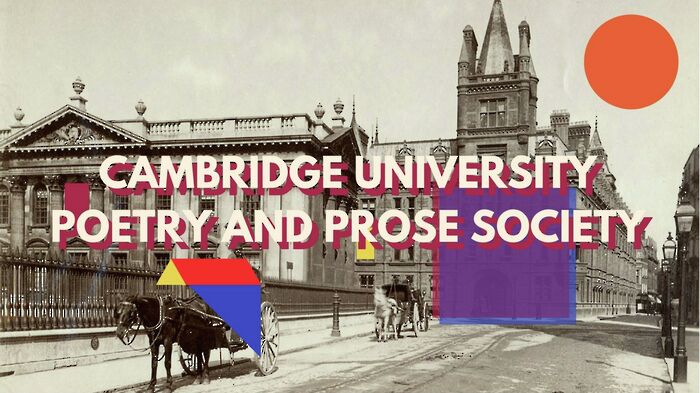Review: Inkwell: a night of art and poetry
Zohra Nabi reviews the closing event of FNTM’s art festival

When invited to the Heong Gallery, I am not quite sure what to expect. Beyond the tempting offerings of spoken-word poetry and artwork from women and non-binary people, all I know is that the night promises to ‘Call in, not call out,’ giving a voice and an audience to artists who face challenges in expressing their identity. With the aim of prompting dialogue between artist and audience, the experience has an incredibly immersive feel. You wander amongst people having animated discussions and debates over the artwork, past poetry stapled to the wall and a series of sculptures by talented postgraduate artist Sophie Mei, who aims to “reframe the viewer’s perception and preconceptions about anatomy.” At the end of the gallery, the poetry published in the magazine is played on a loop, the words providing a wonderful counterpoint to the conversations raised by the exhibits.
“What I saw at Inkwell were women and non-binary people forming themselves”
The individualistic nature of the theme leads to wonderfully different takes on the theme of ‘identity’. I was particularly fond of Alice Tyrell’s self-portrait in the style of an Elizabethan miniature, taking its original use as a keepsake of a loved one, and transforming it into a work of self-care through the intricate detail used to carve out her features. Kimberley Gundle, moreover, finds playfulness in her depiction of ‘Passion and Sensuality’, the flowing ink complementing her many-limbed woman, and the surrealist imagery creating a sense of a dreamy sensuousness. The varying aims and forms of the artists gave the exhibition a tapestry-like effect: some expressing their identity through subverting stereotypes, others through exploring themes, such as Anna Curzon-Price’s take on the relationship between consumerism and femininity, others simply giving the viewer an honest look at their thoughts and ideas.
Later in the evening, an audience gathers for the spoken-word poetry, and a sense of warmth and friendliness surrounds the performances. Deserving particular praise for its rich imagery and beautiful rhythms is Madeleine Pulman-Jones’s poem A Lady on the Metro, which feels as if it belongs to the realm of black and white French cinema. I am utterly captivated, furthermore, by Mary Flanagan’s reading of two poems on gender and identity; the ebb and flow of her speech reflecting the ‘dancing’ between definitions of gender described in the poetry.

The danger any event such as Inkwell runs is an over-intellectualisation of its subject matter. But walking around the exhibits, it seems that this is a danger that its creators avoid, namely by the extremely personal nature of its exhibits. Each piece of artwork is accompanied by an explanation from the artist about their thought process, what inspired them and what the work means to them. Sketchbooks detail the joys and frustrations of individual artists’ creative processes. Post-it notes indicate places where the artists want to add to their work at a later date, while faint outlines of pencil sketches show the reworking of ideas into their eventual form. The evening promised an ‘Intimate space in a public place’, and it is its intimacy that lends the exhibition a truly unique feel.
According to Eimear McBride, a girl is a half-formed thing. But what I saw at Inkwell were women and non-binary people forming themselves, and deciding how they wanted the world to perceive them. It is this, I think, that will endear Inkwell’s future endeavours to Cambridge students. Talking to Jenny Burville-Riley, one of the organisers of the exhibition, she was full of enthusiasm for the future of the project. With the magazine disappearing faster than the team could produce them and postcards flying off of the table, there was the possibility of a podcast being made in the near future. “I’d listen to that,” a passer-by enthusiastically informed us. But whatever Inkwell chooses to do next, I think their honest and open look at identity has given them a captive audience
 News / Eight Cambridge researchers awarded €17m in ERC research grants27 December 2025
News / Eight Cambridge researchers awarded €17m in ERC research grants27 December 2025 News / Downing investigates ‘mysterious’ underground burial vault 29 December 2025
News / Downing investigates ‘mysterious’ underground burial vault 29 December 2025 Lifestyle / Ask Auntie Alice29 December 2025
Lifestyle / Ask Auntie Alice29 December 2025 Sport / Hard work, heartbreak and hope: international gymnast Maddie Marshall’s journey 29 December 2025
Sport / Hard work, heartbreak and hope: international gymnast Maddie Marshall’s journey 29 December 2025 Interviews / Meet Juan Michel, Cambridge’s multilingual musician29 December 2025
Interviews / Meet Juan Michel, Cambridge’s multilingual musician29 December 2025










